Office of Strategic Partnerships, Innovation, Resources and Engagement
2023 ANNUAL REPORT
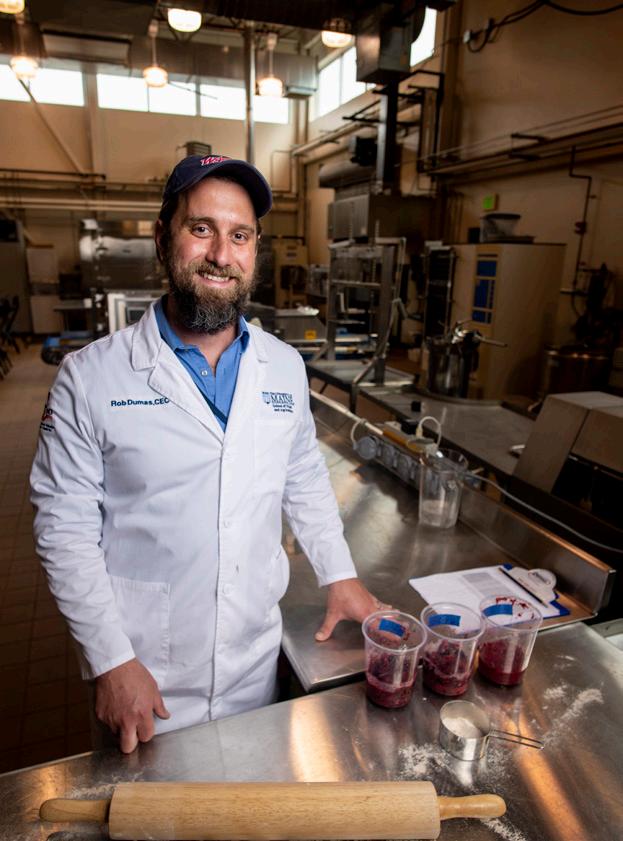



Table of Contents
1 Office of Strategic Partnerships, Innovation, Resources and Engagement (SPIRE)
4 FY2023 by the Numbers
6 Solutions for Maine R&D and Innovation Hub
8 Advanced Manufacturing Center (AMC)
10
15 Food Innovation
Center for Cooperative Aquaculture Research (CCAR)
17 Forestry 18 Foster Center for Innovation
22 Student Startup
Spinoff
23 UMaine
Center (PDC)
24 Process Development
SPIRE

In December 2022, the Office of Strategic Partnerships, Innovation, Resources and Engagement (SPIRE) was officially announced, rebranding the Office of Innovation and Economic Development (OIED) to more fully reflect UMaine’s work in these areas. Building on the legacy of OIED, SPIRE is wholly focused on fulfilling the university’s service mission through a strong emphasis on strategic partnerships, as well as corporate and community engagement.
1 SPIRE ANNUAL REPORT 2023
Taylor Boucher participating in MIRTA Bootcamp
SPIRE is led by vice president of strategic partnerships, innovation, resources and engagement Jake Ward, in close collaboration with associate vice president of strategic partnerships, innovation, resources and engagement Renee Kelly. Two of UMaine’s key industry service centers, the Process Development Center and the Advanced Manufacturing Center, have joined the Center for Cooperative Aquaculture Research as part of SPIRE. All three facilities cater to existing and emerging sectors that are critical to Maine’s economy, and their organization under SPIRE has created new operational efficiencies, as well as new opportunities to serve the state’s businesses. SPIRE also includes affiliated staff members focused on food innovation and forestry, both of whom maintain close ties to external partners in their respective sectors.
In addition to managing development of UMaine research innovations and intellectual property, and supporting entrepreneurship across the University of Maine System, SPIRE leads corporate engagement for UMaine with the help of a new team member. John Burns, longtime managing director of Maine Venture Fund who also spent more than a decade as second vice president of investments at UNUM, joined UMaine as director of corporate engagement in 2022. He is supported by corporate engagement events and programs manager Taylor Boucher, a recent graduate of UMaine’s MIRTA accelerator program program and an MBA candidate at UMaine’s Graduate School of Business. SPIRE’s corporate engagement team is focused on expanding broad and deep relationships with a set of key corporate partners and
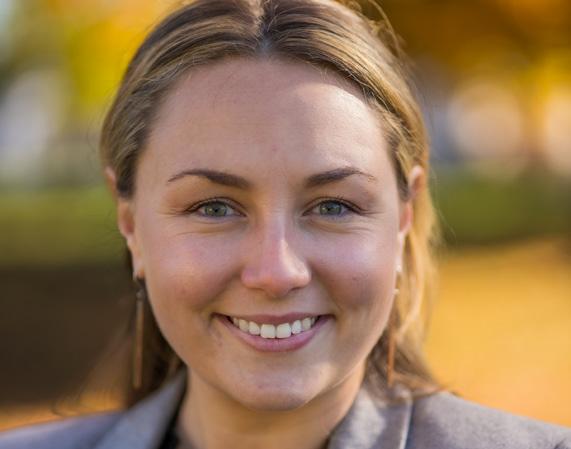
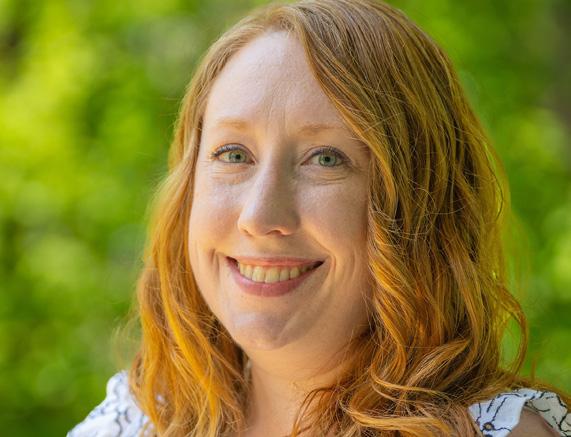


developing strategic plans for UMaine’s ongoing engagement with the business community in Maine and beyond.
Two recently hired special assistants, Katie Gloede and Kerry Chasteen, work directly with Ward and Kelly on logistics, scheduling, and special projects for a rapidly evolving office with many moving parts.
2 UNIVERSITY OF MAINE
From top left to bottom right: Taylor Boucher, Kerry Chasteen, Katie Gloede, John Burns
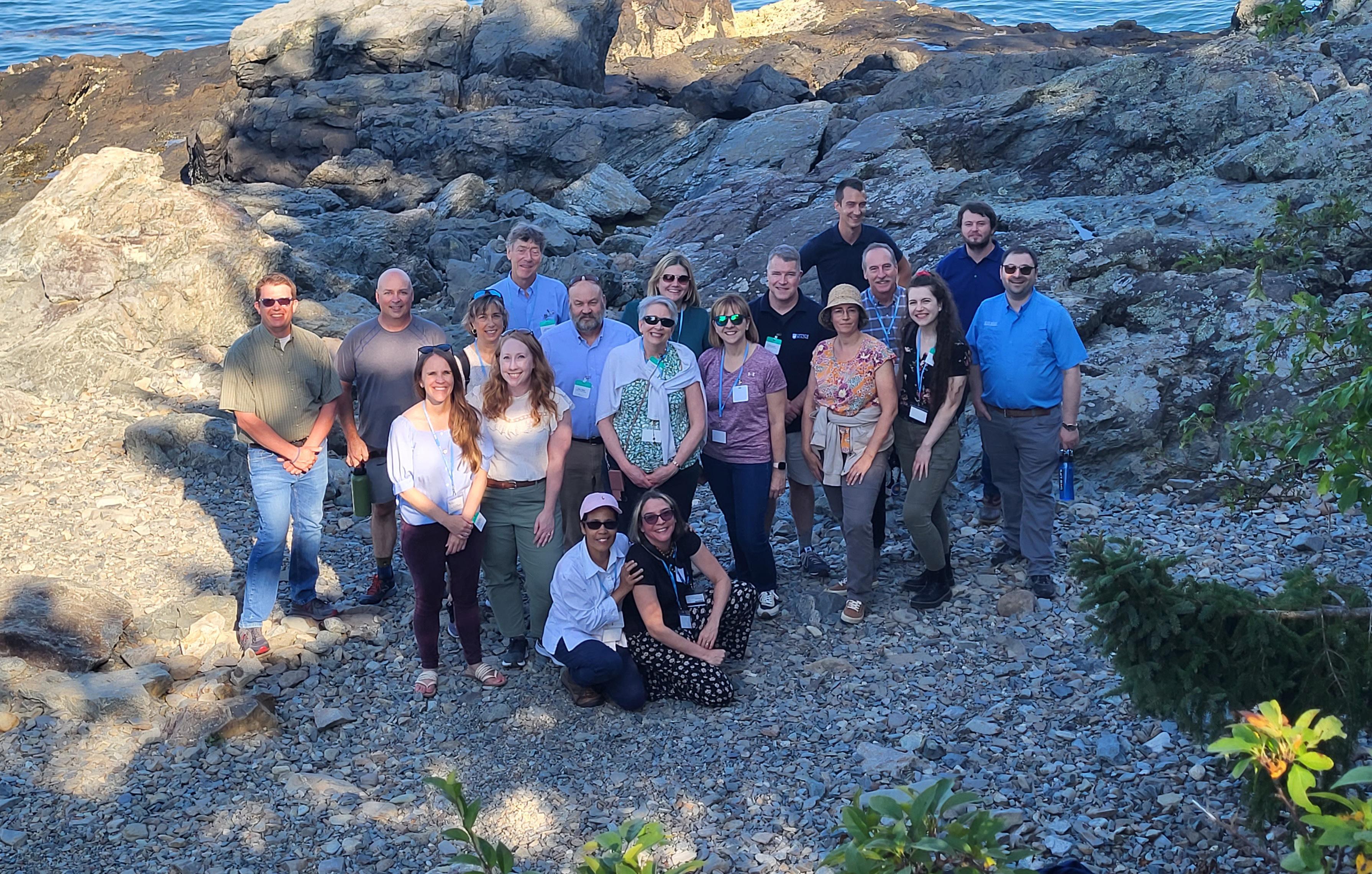
3 SPIRE ANNUAL REPORT 2023 SPIRE retreat in Bar Harbor
452
Value of Industry Contracts 28 Office of Strategic Partnerships, Innovation, Resources and Engagement
$6,428,302 Total
Industry Partners 33 44 FY2023
the Numbers
Businesses
Students Licensing & Commercialization Strategic Partnerships U.S. Patents Issued
179 Projects with Industry Partners Students Paid for Work on DIC Projects Invention Disclosures Filed
Patents Filed $497,412
Revenue Commercialization 4 UNIVERSITY OF MAINE
By
Accelerating
Engaging
334
Total
Total
Wherever you are, we’re here to help.
730 innovation projects with Maine companies in the past five years.
15 55 72 18 12 11 46 38 205 201 7 8 2 7 28 5 5 SPIRE ANNUAL REPORT 2023
SOLUTIONS FOR MAINE R&D AND INNOVATION HUB
The Maine Jobs and Recovery Plan is Governor Mills’ plan approved by the Maine Legislature to invest the State’s share of federal American Rescue Plan relief funds provided by Congress. With $2.5 million in Maine Jobs & Recovery Plan funding, the University of Maine has expanded programming and services to help stabilize and support small businesses and startups dealing with ongoing pandemic challenges that are hindering their growth.
The Solutions for Maine R&D and Innovation Hub, directed by the University’s Office of Strategic Partnerships, Innovation, Resources and Engagement (SPIRE), is designed to help Maine companies with fewer than 250 employees access no-cost services, including technical assistance, counseling, and student talent, to help the achieve recovery and long-term growth.
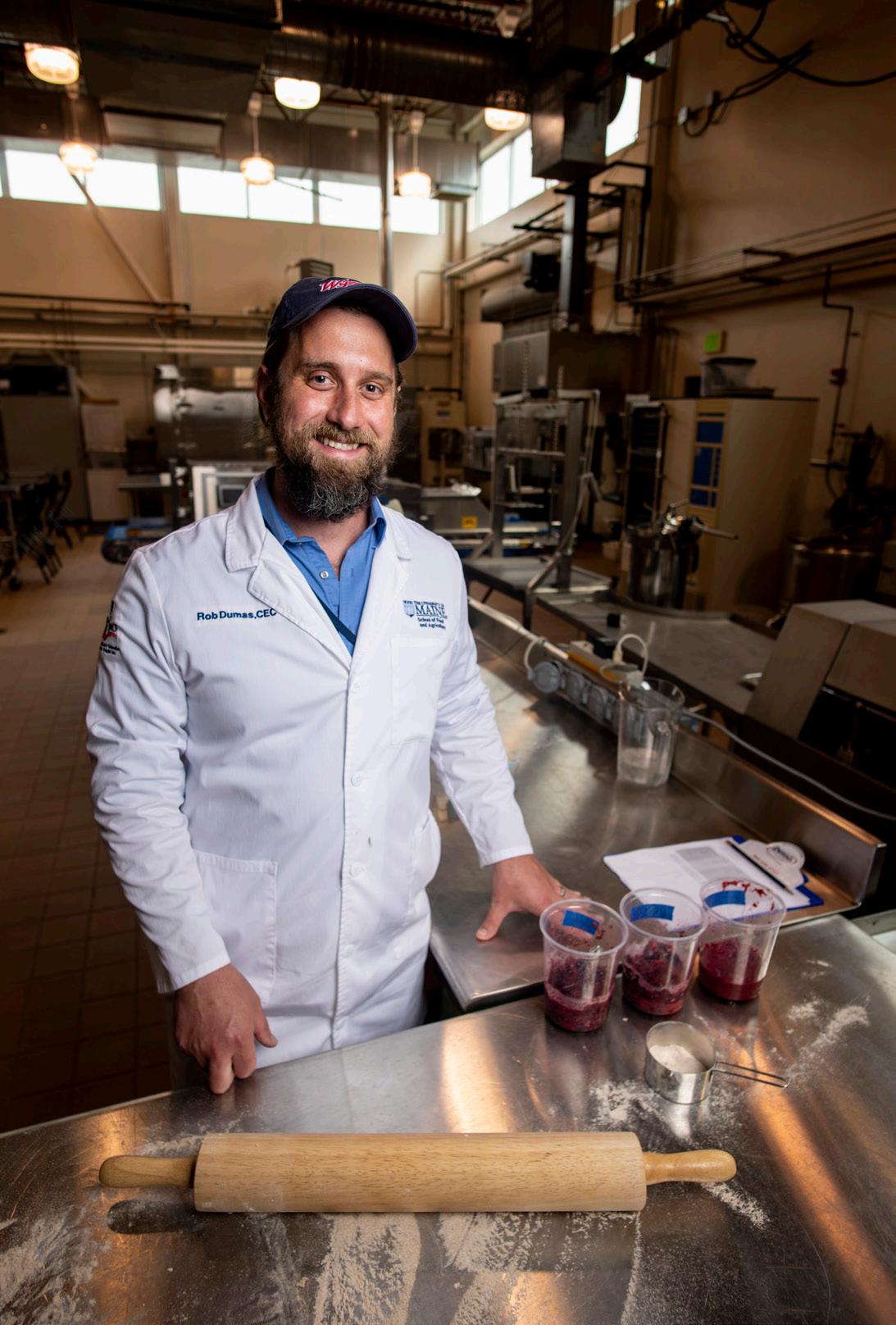
6 UNIVERSITY OF MAINE
Right: Rob Dumas, food science innovation coordinator
Through the hub, startups and small businesses can access services, including:
• Prototyping, testing, and manufacturing design assistance
• Training and coaching on how to identify and reach potential customers
• Counseling from entrepreneurs-in-residence to support business planning and recovery from pandemic delays
• Support from a cadre of undergraduate and graduate students who assist with key business development tasks
Several aspects of the hub’s services — including the award-winning Innovate for Maine internship program and market-fit support for entrepreneurs — have been in place prior to the pandemic but scaled to serve more businesses and provide assistance year-round. This initiative simultaneously provides experiential learning opportunities that prepare students for success in Maine careers and strengthen business partnerships that spark new innovations for Maine’s economy.
The Solutions Hub launched on Jan. 1, 2023. In its first six months of operation, the Solutions Hub has supported 53 Maine companies on 62 projects that have provided work experiences for 54 students.
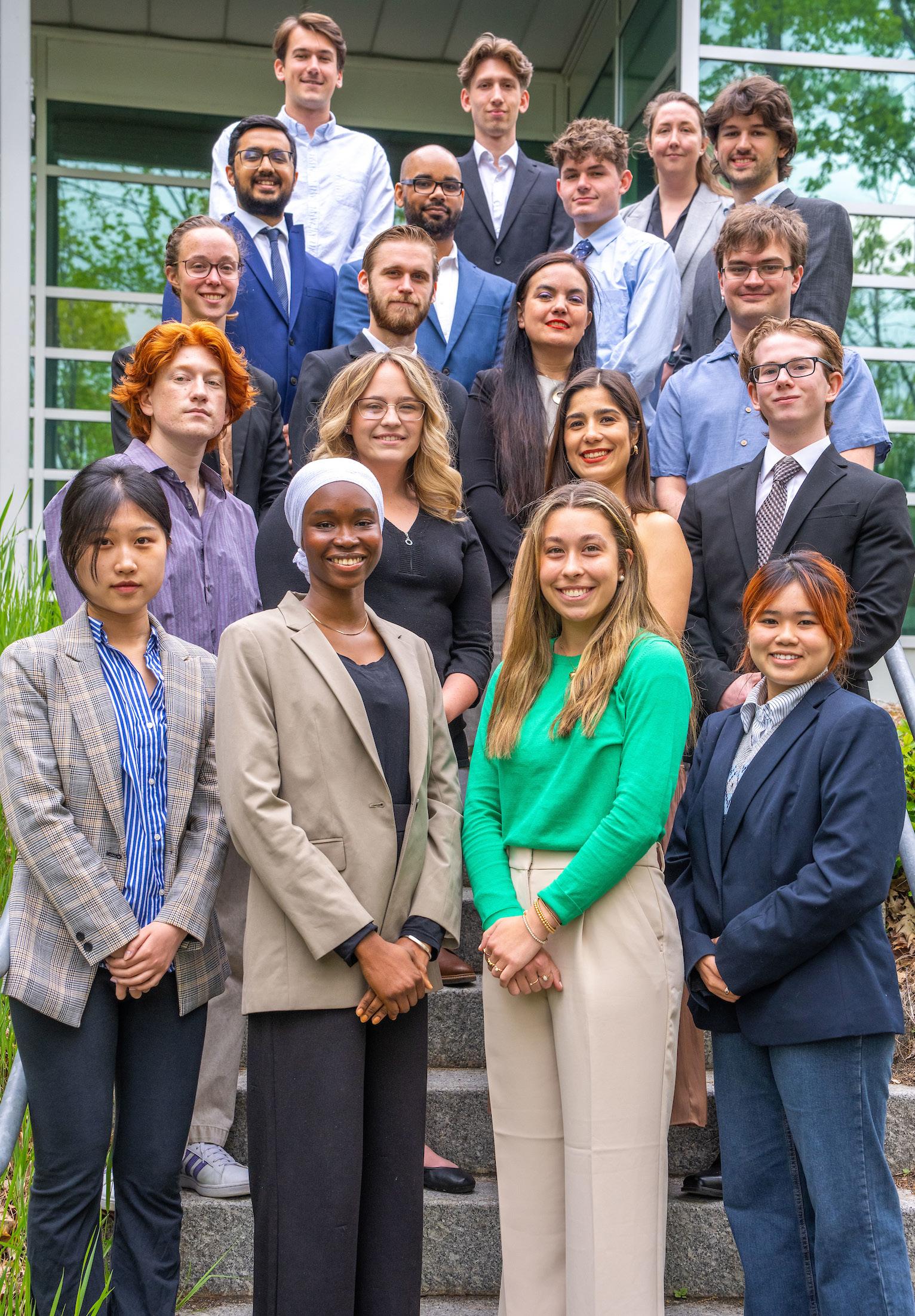 Right: Innovate for Maine, Summer 2023
Right: Innovate for Maine, Summer 2023
ADVANCED MANUFACTURING CENTER
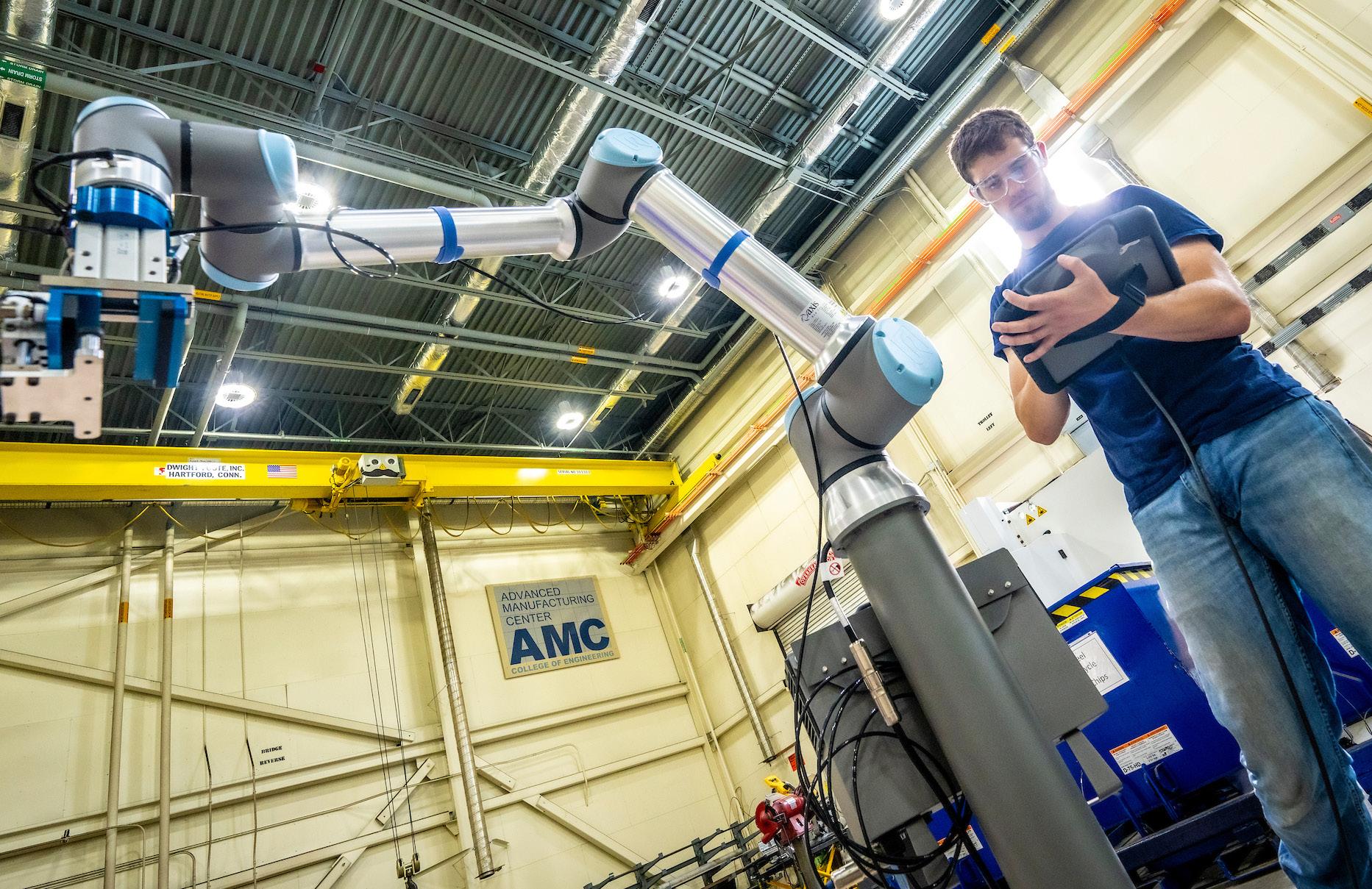
The Advanced Manufacturing Center is an engineering support and service center that is dedicated to promoting economic development in Maine and supporting the research programs at the University of Maine. The AMC is also readily accessible to businesses, entrepreneurs, and researchers throughout Maine and North America.
8 UNIVERSITY OF MAINE
Right: AMC Student Electrical Engineer Will Poole programming a UR Robot for Paradigm Windows’ manufacturing process
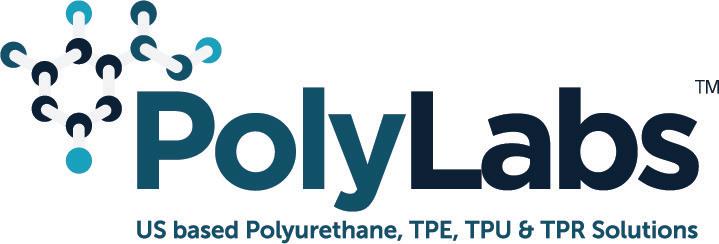
POLYLABS CURRICULUM COLLABORATION
Staff from The University of Maine’s Advanced Manufacturing Center are working with Lewiston-based PolyLabs, a leading producer of molded polyurethane materials and components for defense, medical, and footwear applications, to draft a custom workforce development curriculum designed to provide specialized robotics training.
“The project is a unique pilot for Industry 4.0 workforce development, and we’re using it as a way to pilot customized curricula for their needs,” said AMC Project Manager Forest Wentworth, noting that the center has leveraged robotics equipment donated by GE in Bangor as part of the training program.
The collaboration is made possible through a connection facilitated by Brian Doyle, economic development specialist for the Department of Economic Development for the City of Lewiston. PolyLabs is taking advantage of services provided through the Solutions for Maine R&D and Innovation Hub based at the University of Maine and funded by the Maine Jobs and Recovery Plan to help companies impacted by the pandemic.
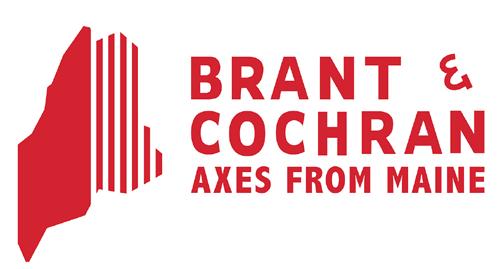
BRANT AND COCHRAN PROTOTYPE AND COLLABORATION
AMC/Manufacturing Extension Partnership Project Manager Forest Wentworth and students have been managing the design and implementation of a new precision manufacturing system to meet South Portland-based axe manufacturer and restorer Brant & Cochran’s growth potential.
The new system will preserve the heirloom quality of the Brant & Cochran product while increasing production from 22 axes a week to 75 and reducing the production time of each axe from three hours to 30 minutes.
These improvements will reduce the 22-week backlog of direct-toconsumer orders, with wholesale orders from brands like Filson, Huckberry, and Solo Stove currently delayed into 2024.
9 SPIRE ANNUAL REPORT 2023
CCAR
The Center for Cooperative Aquaculture Research (CCAR) was founded as an aquaculture research and development facility to address industry needs at industry scale. Located on Taunton Bay in Franklin, Maine, CCAR’s extensive facilities include marine hatcheries, where juvenile fish, invertebrates, and sea vegetables are propagated for research and industry. The center also serves as an aquaculture business incubator, where entrepreneurs can get help with their business plans, find a site for their operations, secure investment capital, engage in research and development, design full-scale commercial aquaculture farms, and utilize our hatchery services. CCAR is a resource for new and established companies, students and faculty, as well as fishermen trying to rebuild natural stocks.
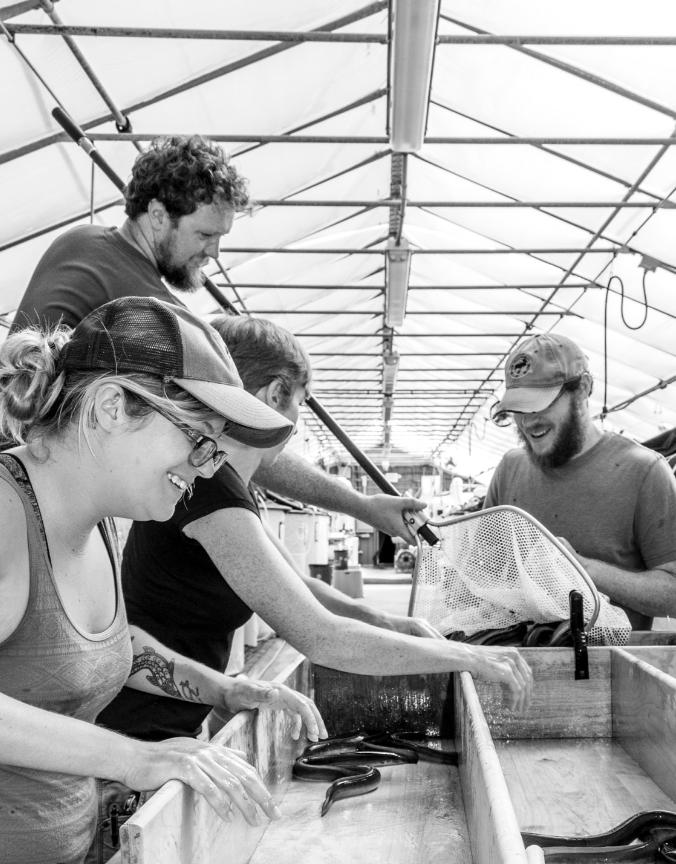
10 UNIVERSITY OF MAINE
American Unagi eel grading at CCAR
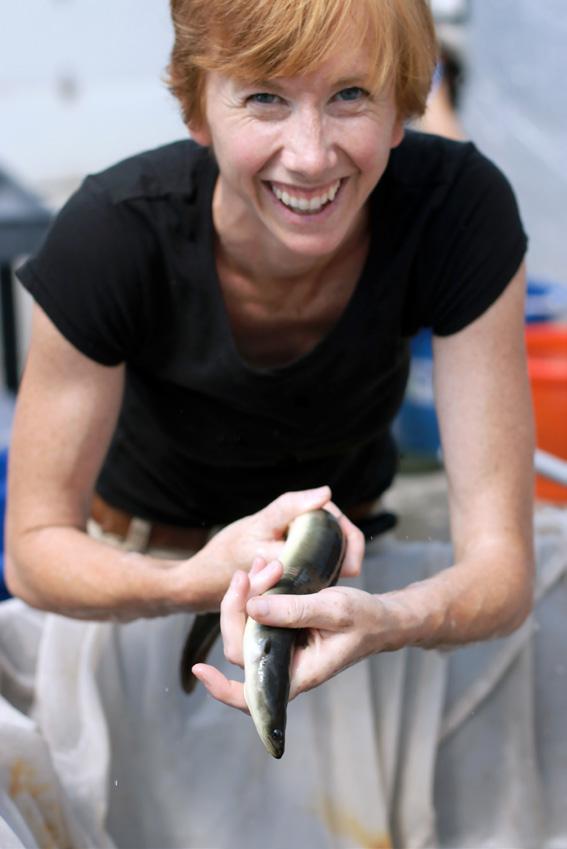
AMERICAN UNAGI
American Unagi, a land-based eel aquaculture farm and longtime business incubator tenant at UMaine’s Center for Cooperative Aquaculture Research (CCAR), has graduated from that space into a newly built 27,000 square foot facility in Waldoboro.
The company’s new headquarters, which employs a recirculating aquaculture system to raise juvenile American eels (called elvers) to adulthood in indoor tanks, is notable for its size and its product. With a goal to produce more than 500,000 pounds of American eel annually, it is the first eel-growing facility of its scale in the United States, and founder Sara Rademaker has built her brand around offering a traceable, responsibly raised alternative to eels imported from Asia.
American Unagi was founded in 2014, and Rademaker started growing her first eels in tanks in her basement. She quickly
outgrew that setup, transitioning the following year to an incubator space coordinated by the Maine Aquaculture Innovation Center at the University of Maine’s Darling Marine Center in Walpole. From there, she moved to the business incubator in 2018 at UMaine’s CCAR in Franklin, which allowed her to scale up production and prepare to transition to her custom-built facility in Waldoboro.
The ability to both build her business incrementally and plug in to Maine’s expanding aquaculture network have helped Rademaker prepare American Unagi for its next chapter.
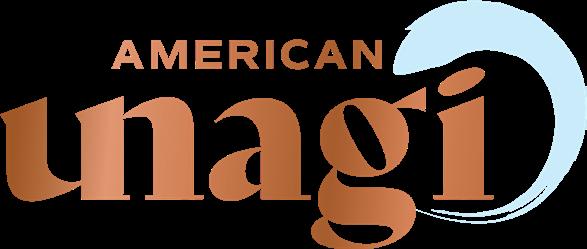
“I tapped into every single resource that I could, and at each phase of my company’s growth those connections have helped with different needs,” Rademaker said.
“There are many business resources in Maine that can support you in market research, or proof of concept, and as your business grows, you end up having a support system and network that builds long term resilience into your business.”
11 SPIRE ANNUAL REPORT 2023
Sara Rademaker, CEO and founder of American Unagi
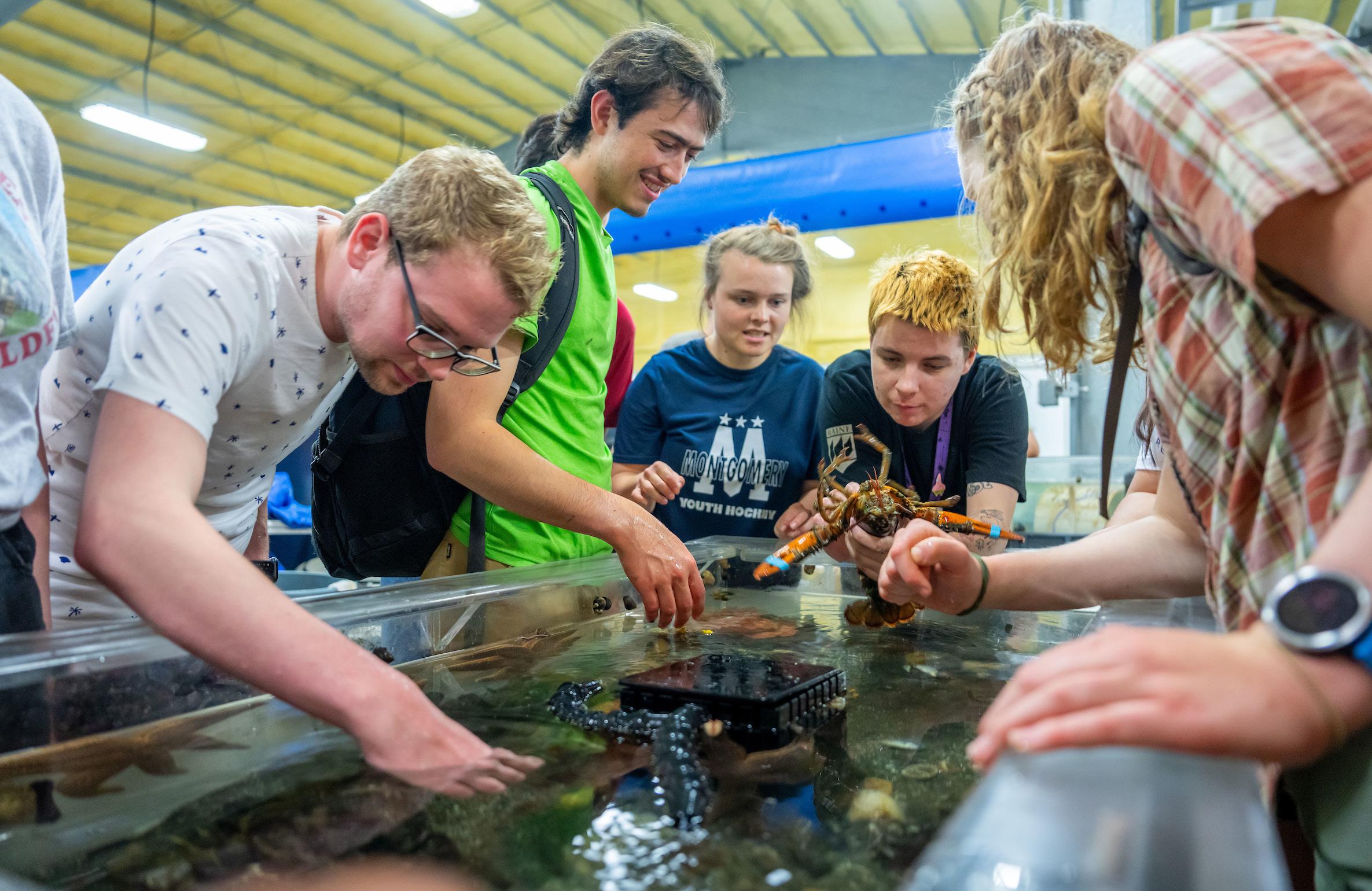 CCAR’s mobile touch tank provides hands-on learning experiences
CCAR’s mobile touch tank provides hands-on learning experiences
CCAR’S EDUCATION AND WORKFORCE DEVELOPMENT
Fostering connections between youth and Maine’s aquaculture industry has been a core focus of aquaculture workforce development at CCAR. The center’s active participation in developing the 4-H Aquaponics Project has been crucial in achieving this goal. Since its inception, the 4-H Aquaponics Project has expanded access to aquaculture education opportunities for Maine’s youth and generated an increase in:
1. Raising awareness and enhancing understanding of the aquaculture industry and its related technologies.
2. Enriching knowledge about potential aquaculture careers.
3. Inspiring aspirations toward careers in aquaculture.
4. Building knowledge about innovative aquaculture systems.
5. Strengthening the capacity for delivering high-quality aquaculture education.
Since its establishment, this program has directly engaged over 400 youth and educators across the state. Graduates of the 4-H Aquaponics Project have transitioned into influential roles, serving as youth ambassadors for aquaculture. Some have transitioned into peer leadership roles, helping to deliver 4-H aquaculture curriculum at community events, while others dive deeper into

career exploration by participating in job shadowing and internship opportunities at CCAR.
CCAR has maintained its role as a leader in recirculating aquaculture systems in Maine and beyond through the development of virtual and hands-on programming for both formal and informal education spaces. The center hosts on-site tours, workshops, and interactive field trips for learners of all ages and abilities. The site, along with its industry partners, has become an invaluable resource for undergraduate education, regularly providing opportunities for students in the School of Marine Sciences and the School of Food and Agriculture. In addition, the center provides employment and mentorship opportunities for undergraduate students, equipping them with the necessary skills for future careers in Maine’s blue economy.
13 SPIRE ANNUAL REPORT 2023
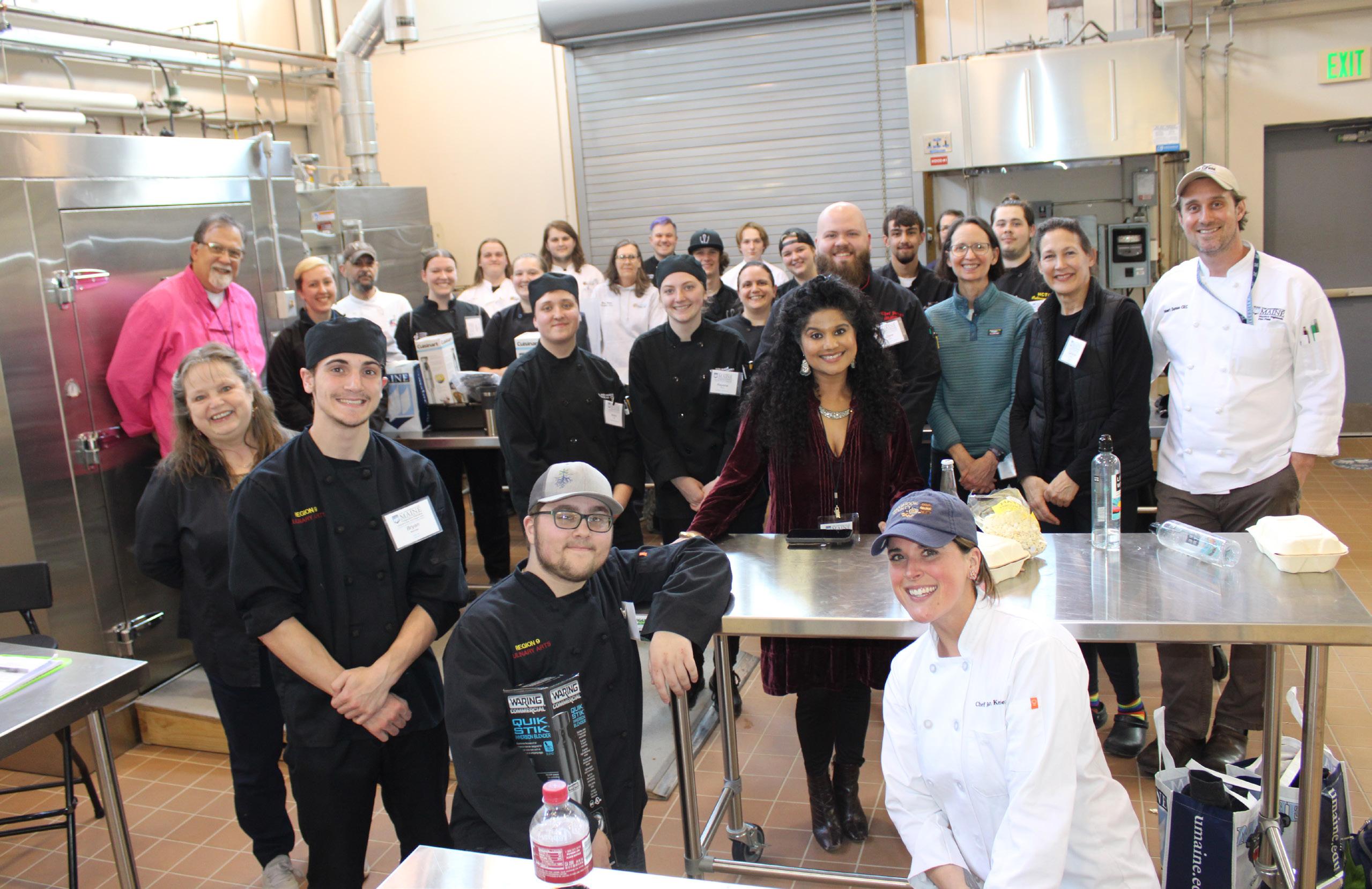
14 UNIVERSITY OF MAINE
CTE culinary arts students and local chefs in the UMaine Food Pilot Plant
FOOD INNOVATION
PDAL FOOD COMPETITIONS, TRAINING, AND SUMMER TOUR
Rob Dumas, UMaine’s food science innovation coordinator and manager of the Matthew Highlands Food Pilot Plant, is partnering with UMaine Cooperative Extension on a grant that brings culinary arts instructors from across the state together to learn about the vast array of nutritional raw materials in Maine.
Through the Professional Development in Agricultural Literacy grant, Dumas and extension professor Kathleen Savoie are teaching the state’s culinary technical instructors about the diverse economic food chain that exists in Maine, and connecting instructors, students, and businesses in a dynamic web of flavors and textures from all over the state.
“At the very beginning, our intention was to strengthen our food system here in Maine. We thought we could do that by helping career tech education have a better understanding of Maine’s food system,” said Dumas. “Having it in the curriculum of 700 career tech educators throughout the state and getting them exposed to and inspired by Maine foods will hopefully lead to a lifelong
interest in those foods – seeding it into careers and in turn creating more demand for Maine-grown food and more opportunities for Maine’s producers.”
Dumas and Savoie visit classrooms across the state, providing culinary arts instructors with a firsthand look at their teaching methods and interaction with students, and exposing them to diverse instructional styles. Savoie, a registered dietitian, and Dumas, an American Culinary Federation certified executive chef, offer participants a wealth of knowledge. They can take the students through activities that are modeled after the practical exam that students would take if they sought certification. All the ingredients that are used are local from the fall bounty of carrots, pumpkins, onions, garlics, beets, radishes, and turnips. Local proteins are also on hand. Immersing both the instructors and the students in these food networks helps to foster a better understanding of how Maine’s agricultural roots sustain Maine’s economy and nutritional health.
15 SPIRE ANNUAL REPORT 2023
After the visits, instructors take a multi-day bus tour of agricultural businesses across the state to learn more about the raw materials chefs work with day in and day out.
COLLABORATION WITH THE GOOD CRUST
Rob Dumas, UMaine’s food science innovation coordinator and manager of the Matthew Highlands Food Pilot Plant, collaborated with Heather Kerner, CEO of the Good Crust, a pizza dough manufacturer in Canaan, Maine, to help the company scale up their dough-making and test freeze it for shipping. The Good Crust, which utilizes 100% Maine-sourced, sustainably grown grains in its dough, is now being offered to more than 150 breweries, food service programs, restaurants, and natural food stores throughout Maine and New England.
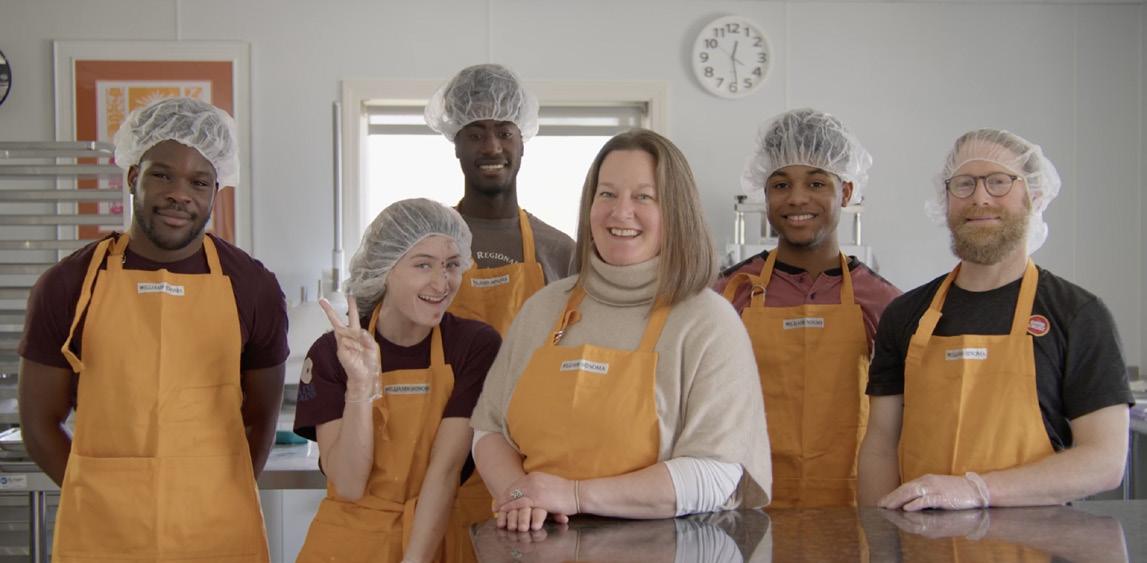

16 UNIVERSITY OF MAINE
Good Crust’s lobster pizza
Heather Kerner, CEO and founder, and the Good Crust team
FORESTRY
CONFIR RECEIVES NSF ENGINES AWARD TO BOOST NEW FOREST PRODUCTS
The University of Maine has partnered with research institutions and community organizations across Northern New England to devise new forest products and management strategies using $1 million from the National Science Foundation (NSF).
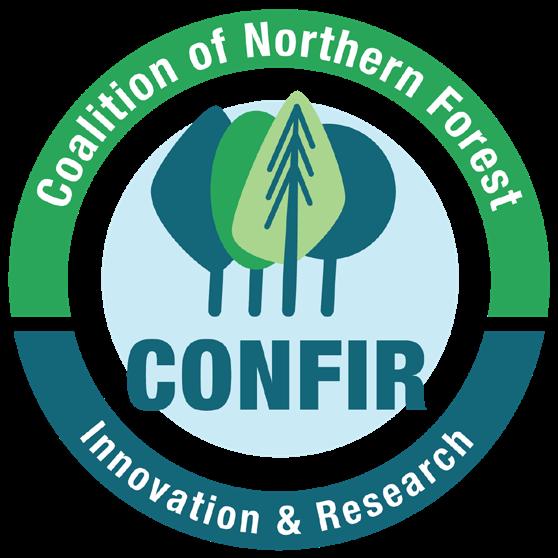
The Coalition of Northern Forest Innovation and Research (CONFIR), led by the Northern Forest Center in Concord, New Hampshire, is among the first recipients of the new NSF Engines Development Award, created to bolster research and development among robust partnerships that will accelerate technological, economic and workforce development at the regional level.
With this funding, CONFIR will spend the next two years creating various research proposals to earn the title of NSF Engine and the opportunity to receive up to $160 million. That funding would allow the group to conduct research and design products that will open new markets for rural economies and preserve the Northern Forest for years to come.

17 SPIRE ANNUAL REPORT 2023
FOSTER CENTER
The Foster Center is the Office of Strategic Partnerships, Innovation, Resources and Engagement’s hub of innovation-focused activities at the University of Maine and the state’s leading resource for innovation and commercialization. The Foster Center offers graduate courses and a certificate program in Innovation. Serving both the campus community and outside businesses and organizations, the center provides incubation space for student-run businesses, research and startup accelerator programs, training for faculty and students looking to commercialize research, and internships through the Black Bear Consulting Corps and Innovate for Maine Fellows programs.
MIRTA
Five teams participated in the Maine Innovation Research and Technology Accelerator (MIRTA) 6.0 Cohort, developing research ideas and honing them into possible commercial-ready products.
In 2023, for the first time, Fellows from the Graduate School of Business assisted teams with their projects. Also for the first time, MIRTA joined with Maine Health to help one of their employees bring one of their innovations closer to market.
MIRTA was designed to assist University of Maine System researchers advance lab discoveries into public and commercial use, and the program has expanded to support innovations from other Maine research institutions. The accelerator is administered by the Office of Strategic Partnerships, Innovation, Resources and Engagement (SPIRE) out of the Foster Center for Innovation, with support from Maine Technology Institute and the University of Maine System Research Reinvestment Fund. Over the course of the program, guided by program staff and external advisers, teams engage in customer discovery, market analysis, prototyping, partnership development and technology evaluation to map strategies for bringing their research to market.
SUNRULE
The first installation of an interactive sculpture that harnesses the rays of the sun to help users explore multiplication and division has been installed in a public park near UMaine, the product of a unique partnership between the University of Maine and the town of Orono, Maine.
The SunRule, invented by UMaine associate professor of mathematics education and instructional technology Justin Dimmel and associate professor of mathematics education Eric Pandiscio, was installed at Webster Park in October 2022. The SunRule sculpture concept evolved through UMaine’s MIRTA accelerator, a program designed to advance research along the path to
18 UNIVERSITY OF MAINE
commercialization, turning lab innovations into real-world products and services with public benefit. The prototype sculpture was designed and built by UMaine associate professor of art Greg Ondo and sculpture studio technician Sam Hoey. UMaine graduate Emma Reedman ’21 also was a member of the development team.
MUDDY RIVER FARM AQUAPONICS
Growing oysters to market size typically takes up to three years due to colder winter temperatures, but a new land-based growing system developed by Ph.D. student Matt Nixon and Advanced Structures and Composites Center (ASCC) researcher Dr. Doug Gardner has reduced that timeframe to five months. Nixon formed Muddy River Farm Aquaponics to use this new technology in the world’s first 3D-printed, closed-loop oyster growing system.
Nixon is opening a 15,000-square-foot facility in Bath, Maine to house the system, where he hopes to grow 1,000,000 oysters in his first year. His vision is to provide low-cost and healthy vegetables, freshwater fish, and seafood using sustainable, resilient, and innovative methods and growth techniques. The system is not dependent on access to saltwater since he is able to make his own on-site.
Nixon brainstormed with Gardner on an innovative and costeffective way to grow oysters, bringing the resulting idea–a patent-

pending design of a 3D-printed oyster pod–to life. Nixon and Gardner further developed the business model through the Foster Center’s I-Corps program and MIRTA accelerator. The Sustainable Materials & Manufacturing Alliance for Renewable Technologies (SM²ART) program between the University of Maine’s ASCC and Oak Ridge National Laboratory, which offers short-term technical collaboration partnerships that enable industry partners to tap into UMaine and Oak Ridge National Lab capabilities, supported the project’s technical development.
19 SPIRE ANNUAL REPORT 2023
Outside view of the Foster Center for Innovation

Matt Nixon: “Without UMaine’s SM²ART and the immense support that their staff and faculty have provided over the past six years, my company never would have gotten off the ground. Where others saw daydreams, UMaine saw potential and operationalized that potential through I-Corps, MIRTA, and their partnership with Oak Ridge National Labs. They have been a tremendous partner, an intense listener, and a critical pillar of support.”
INNOVATE FOR MAINE AND BLACK BEAR CONSULTING CORPS
In 2023, the Innovate for Maine fellows program doubled in size to nearly 40 students with assistance from Maine Jobs and Recovery
Plan funding that made hosting an IFM fellow free for qualifying businesses.
Innovate for Maine connects the most innovation-minded Maine college and graduate students with Maine’s most exciting growing companies for paid summer fellowships designed to accelerate company growth. Through training and hands-on work experiences, student fellows develop innovation skills and learn about the dynamic entrepreneurial and innovative companies operating in the state.
STUDENT SPOTLIGHTS
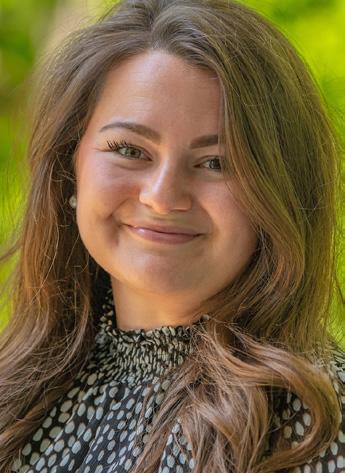
Marissa Espinosa
Now working toward graduating from UMaine in 2025 with her B.S. in Business Administration Management, Marissa first came to the Pine Tree State from Kentucky as a member of the U.S. Navy. Before that, she worked in both Congress and her state legislature where she assisted a family through the international adoption process and brought their child home to the U.S. after a seven-year battle with a foreign government. Marissa describes herself as outgoing, hardworking, and personable, and she loves working with people. Marissa was a 2023 Innovate For Maine Fellow at The Devil’s Half Acre Distillery, Maine’s only veteran-
20 UNIVERSITY OF MAINE
Black Bear Consulting Corps, Spring 2023
owned distillery and makers of the award-winning “Jigger & Jones” gin.
Sean Fuller
Originally from Eliot, Maine, Sean is a wellrounded student who made Dean’s List for the Spring 2023 semester. He double majors in Computer Science and New Media with a minor in Creative Writing. He describes himself as reserved, meticulous, and creative, spending his free time directing student films and enjoying the people and scenery of Maine. Sean was a 2023 Fellow with both Hootenanny Bread in Damariscotta and Move Free activewear on Mount Desert Island.

TYLER TECHNOLOGIES
Now entering its third year, a partnership between the Office of Strategic Partnerships, Innovation, Resources and Engagement and Tyler Technologies is bringing high school and middle school students from across the state to experience how UMaine’s flagship research university is innovating in STEAM disciplines.
In 2021, Tyler Technologies brought UMaine’s Foster Center for Innovation on as a partner in the company’s Maine App Challenge (MAC), an annual app development and scholarship competition.
As part of an effort to engage more Maine students in the Challenge, the Foster Center team developed a series of workshops designed to help students incorporate innovation principles into the apps they developed for MAC. UMaine’s innovation workshops are heavily weighted in the MAC judging rubric, and students who complete the workshop series are eligible to earn Level 1 Innovation badges in the University of Maine System microcredential pathway.
Students who submitted apps for the 2021-2022 MAC were invited to participate in a special “innovation tour” at UMaine, visiting the Advanced Structures and Composites Center, the VEMI Lab, and the Foster Center. Off that successful blueprint, the tour program was expanded for the 2022-2023 MAC season, and students on four additional tours have had the opportunity to explore the Ferland Engineering Education and Design Center, interact with faculty and students in disciplines including engineering and computer science, “ride” in the VEMI Lab’s autonomous simulator, and much more.
To date, 150 students from 24 districts across Maine have registered for Tyler Tech-sponsored tours of the Orono campus, and the program is growing. An MOU signed in 2023 will not only expand the tour program over the coming year, but also offer students the opportunity to earn college credit through a dual enrollment innovation course sponsored by Tyler, as well as innovation training opportunities for Maine educators who want to teach innovation concepts built around MAC participation.
21 SPIRE ANNUAL REPORT 2023
STUDENT STARTUP

VETERINARY IMMERSION PLAN
Zachary Inniss incubated his business, The Veterinary Immersion Plan, at the Foster Center for Innovation in the fall of 2022 and spring of 2023. He describes VIP as a solution that provides individuals with the information, support, and resources they need to explore, cultivate, and grow their passion for veterinary
medicine. This plan offers a roadmap to help individuals discover different fields, build their educational foundation, and connect them with the right resources and opportunities. VIP’s goal is to eliminate barriers and create a more accessible and diverse veterinary field.
In April of 2023, VIP hosted the Veterinary Exploration Summit for undergraduates looking to explore their interests in the field of veterinary medicine. The immersive on-campus event, open to all UMaine undergraduates, was sponsored by Rarebreeds Veterinary Partners.
At the summit, undergraduates had the opportunity to learn from experts in the field, get hands-on experience in various veterinary disciplines such as surgery, aquatics, and regulatory, and network with current veterinary professionals.
Inniss continues to promote VIP on his social media channels, helping undergrads navigate the complex and challenging world of veterinary careers and helping students achieve their dreams.
22 UNIVERSITY OF MAINE
VIP wins 2023 Innovation Award
UMAINE SPINOFF
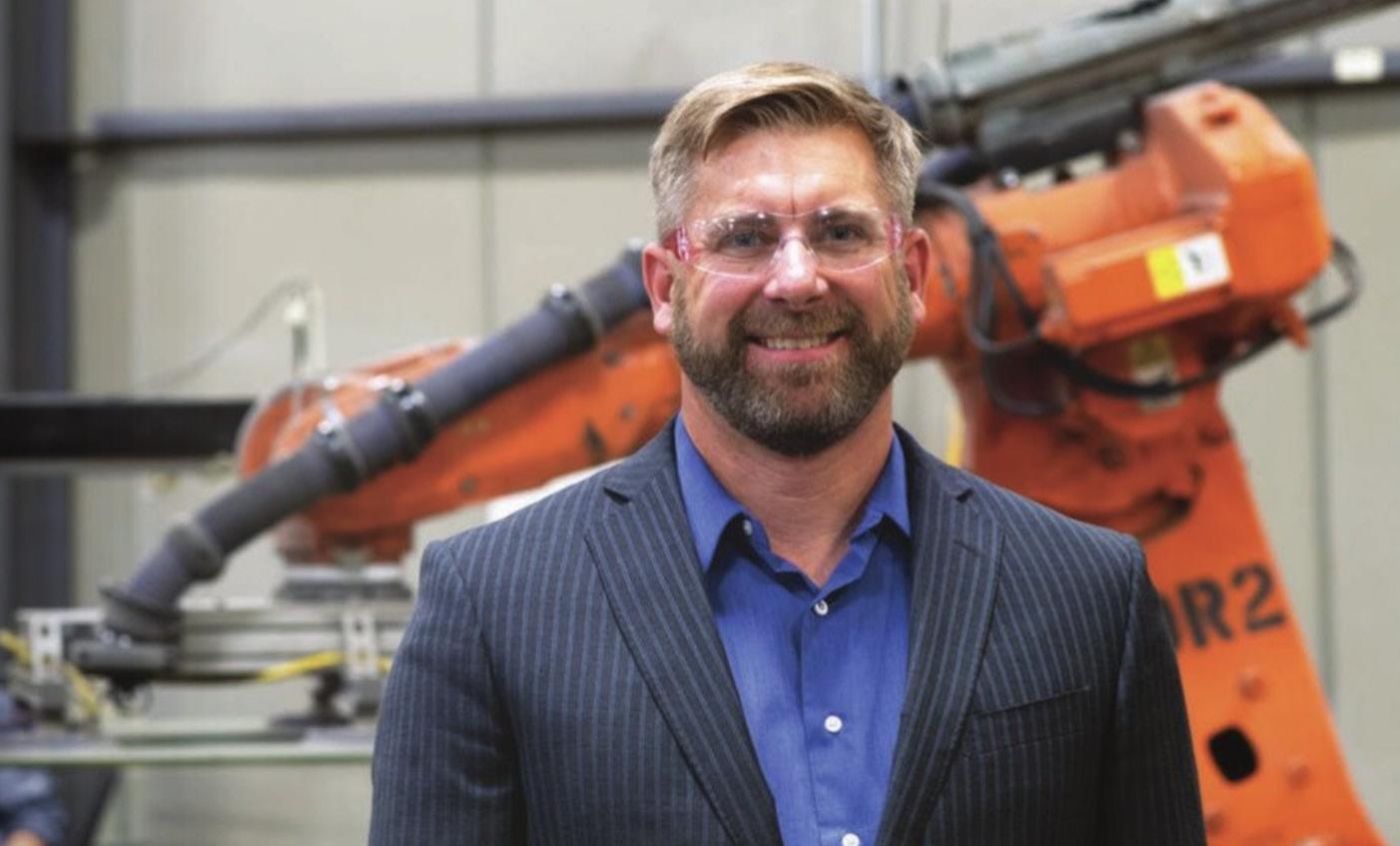
COMPOTECH
In 2023, UMaine spin-off Compotech was named to Inc. Magazine’s 5000 list of the fastest-growing companies in the United States and was listed as the 13th fastest-growing manufacturer, with 599% three-year growth. Compotech is bringing innovative advanced defense technologies to market to save lives and protect American
soldiers. It designs, develops, and manufactures blast and ballisticresistant structures and materials. Based in Brewer, Maine, the company is growing rapidly with plans to double its revenue and add 20 high-quality jobs in fields like software engineering, robot operation, and composites technicians in 2023, bringing their total employment to more than 45.
The company’s global reputation for quality and its innovative use of AI and robotics in manufacturing earned it honors as one of the top 12 composites shops in the world for two years in a row. In addition, the company’s Fragmentation Rapid Analysis Generator using Computed Tomography, or FRAG-CT, was named one of the top 100 innovations in 2021 by Popular Science magazine.
They continue to work with the University’s Advanced Structures and Composites Center to develop innovative defense technologies and the Advanced Manufacturing Center to increase productivity by implementing new automation processes with molding and robotics. They also recruit talent from various UMaine programs. In 2023, Compotech took advantage of the Solutions for Maine R&D and Innovation Hub by participating in the Market Match program to explore new market opportunities and by working with Innovate for Maine Fellow Will Carrolton, a UMaine student who hails from Bath, Maine. The company brought on Will as an employee upon completion of his internship.
23 SPIRE ANNUAL REPORT 2023
Compotech president Paul Melrose
PROCESS DEVELOPMENT CENTER
The University of Maine Process Development Center (PDC), long recognized for its expertise in processing fiber for pulp and paper applications, with funding from the Northern Border Regional Commission, is now home to new equipment that will advance renewable packaging research significantly for Maine’s forest products industry.
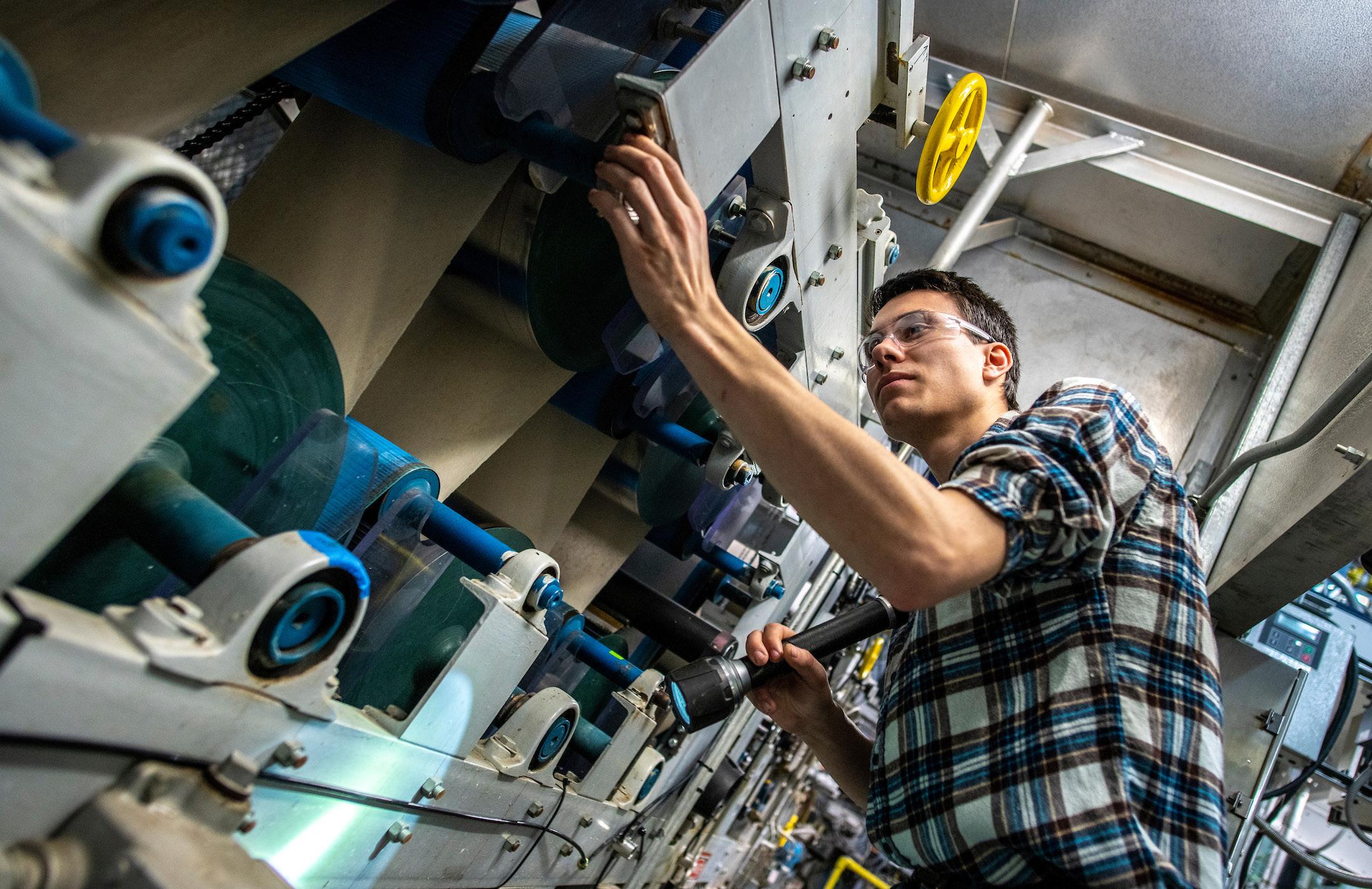
The PDC’s pilot paper machine is supporting industry’s transition to sustainable packaging
SUPPORTING INNOVATIONS WITH FOREST BIOMATERIALS
Kiefel, an international leader in thermoforming and joining technology that is part of the Siegsdorf, Germany-based Brueckner Group, has selected UMaine as a key research partner to expand and accelerate its expertise in fiber thermoforming. Thermoforming is a manufacturing process, traditionally employed with plastics, that uses heat and pressure to form sheets of material into threedimensional objects using a mold. With Kiefel’s fiber thermoforming machines, packaging can be manufactured from natural fibers such as cellulose, straw or plants instead of plastic.
In response to current societal trends favoring renewable materials over fossil-fuel-derived packaging options, the molded pulp products (MPPs) packaging segment is experiencing significant growth. This trend is anticipated to continue for years to come. While there is increasing demand for non-plastic products in the traditional molded pulp industry, there remains a challenge in fully replacing plastic in high-performance product areas.
Over the past year, the PDC has hosted several companies, providing them access to the Natureformer for assessing both wood and non-wood feedstocks. Additionally, these companies have utilized the machine to investigate innovative oil and grease barrier formulas, offering sustainable alternatives to PFAS (per- and polyfluorinated substances).

In addition to supporting industry client trials using the Natureformer, the PDC has also facilitated several research projects. Dr. Mehdi Tajvidi successfully produced fiber-based trays using a combination of wood flour and cellulose nanofiber, eliminating the need for additional adhesives. This research holds tremendous potential for advancing wood fiber applications. Furthermore, PDC Senior Scientist Seongkyung Park conducted a series of trials using the Natureformer to explore a variety of wood-based feedstocks, ranging from recycled materials to bleached softwood.
25 SPIRE ANNUAL REPORT 2023
Colleen Walker, PDC director, showcasing the Natureformer
5717 Corbett Hall, Orono, Maine 04469
207.581.1479 | inspire@maine.edu
In complying with the letter and spirit of applicable laws and pursuing its own goals of diversity, the University of Maine System does not discriminate on the grounds of race, color, religion, sex, sexual orientation, transgender status, gender, gender identity or expression, ethnicity, national origin, citizenship status, familial status, ancestry, age, disability physical or mental, genetic information, or veterans or military status in employment, education, and all other programs and activities. The University provides reasonable accommodations to qualified individuals with disabilities upon request. The following person has been designated to handle inquiries regarding non-discrimination policies: Director of Equal Opportunity, 5713 Chadbourne Hall, Room 412, University of Maine, Orono, ME 04469-5713, 207.581.1226, TTY 711 (Maine Relay System).
Office of Strategic Partnerships, Innovation, Resources and Engagement












 Right: Innovate for Maine, Summer 2023
Right: Innovate for Maine, Summer 2023






 CCAR’s mobile touch tank provides hands-on learning experiences
CCAR’s mobile touch tank provides hands-on learning experiences













